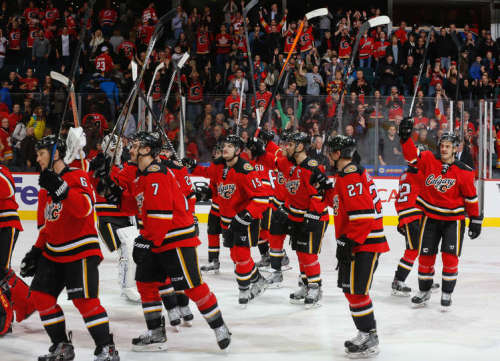Calgary Flames proving “Fancy Stats” wrong

Not even fans of the Calgary Flames could have foreseen the start their team has had this season, let alone that they could maintain that success into November. Their 13-7-2 record has them in third place in the Pacific Division as of Nov. 24th and as December inches closer they don’t appear to be letting up.
But the question, from fans and players alike, still remains: How has a team – thought to be a shoo-in to at least compete in the Connor McDavid sweepstakes before the season – outdone the likes of such division foes as the San Jose Sharks and Los Angeles Kings?
Well, Calgary’s success is essentially a nightmare for the pencil-pushing advanced analytics fanatics around the league. Their Corsi and Fenwick numbers – two stats whose stock has increased immensely in hockey circles – have been awful, but haven’t hurt them. Yet.
Calgary’s Corsi For percentage at 5-on-5 close (in a one-goal game or tied game) is 44.8 (27th in the league), and at regular 5-on-5 play is 43.7 (29th). Calgary’s Fenwick For percentage, meanwhile, is 46.5 (24th) at 5-on-5 close, while at 5-on-5 it is 45.6 (27th). Basically, Calgary is in possession of the puck much less than its opponents are and also generates far fewer scoring chances than they do.
The point of all this is Calgary’s success has been highly improbable to say the least, and likely can’t be sustained going forward unless the team makes some major changes to its strategy. But while the style of game they play may catch up to them later in the season, it has, to this point, kept them in the playoff picture in the Pacific.
The conventional stats give a better indication of why that has been the case. The team is scoring at a clip of 3.09 goals per game (5th in the league) and is middle-of-the-pack in goals against per game (18th), allowing an average of 2.73 per game.
Helping things has been the fact Mark Giordano and TJ Brodie – two of the team’s most important pieces on the blue line – have been the offensive leaders. They’re first and third respectively in team scoring and first and fourth respectively in scoring among NHL d-men.
Their goaltending has been great – Hiller more so than Ramo – and has been enough to steal the team a few games. Up front the forwards as a group have been slumping, but what offense they have gotten has come from throughout the lineup.
But perhaps the most defining trait of the Flames, and the biggest reason for their success, has been the no-quit attitude they take into every game. And given the lack of star power in their lineup, that attitude is something the Flames have to rely on fairly often.
Against the Chicago Blackhawks Oct. 15 the Flames were outshot 50-18, but still won 2-1 in OT; on Nov. 8 it took a three-goal third period for the Flames to defeat the Florida Panthers; and, facing the New Jersey Devils Nov. 22, the Flames scored twice with under 2:30 to play in the third – tying the game with five seconds left – before winning in a shootout.
This type of effort from the Flames has become the norm this season, and the results above only include games in which the Flames have had to come from behind. But the Flames play with that same energy and tenacity even when defending a lead, helping them rack up even more wins.
That’s why, despite their possession numbers being so poor through 22 games, it hasn’t mattered much for the Flames. Can they keep this up over an 82-game stretch? Probably not. But then again, they’ve defied the odds thus far.
*Corsi and Fenwick numbers courtesy stats.hockeyanalysis.com


[…] stats community has basically all but buried the 2015-16 Flames, claiming a poor Corsi and Fenwick proves they are a fluke. While advanced stats can be a useful tool which tells a small percentage of the whole story, using […]